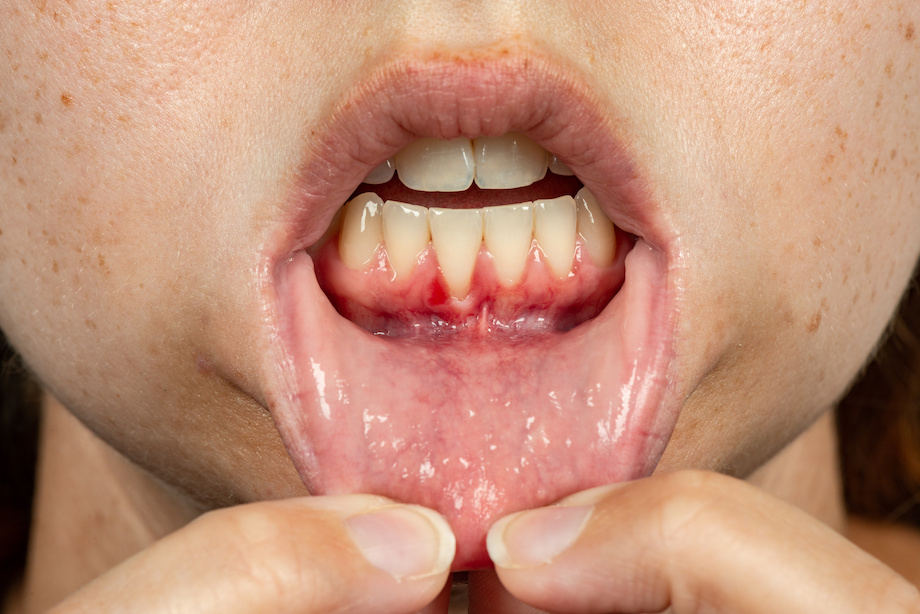
Gum tissue recession, a common side effect of periodontal disease, can be detrimental to your oral health, leave you at greater risk for whole body health concerns linked to gum disease, and it can negatively impact your appearance. After treating conditions that lead to soft tissue recession, most people have just one question, “Will the recessed gums grow back?” In this blog, the McCarl Dental Group team provides the short answer to that question and a more detailed explanation as well as details about how this issue is addressed in our Millersville dental office.
The Short Answer
Simply speaking, no. Recessed gum tissue does not grow back, which is why it’s so important for people to seek treatment as soon as they notice the warning signs of gum disease the most common cause of soft tissue recession. Preventing further gum tissue recession as well as other oral and whole body health concerns that are linked to advanced gum disease is essential.
The Longer Answer
While the soft tissue that has receded won’t regrow, gum disease treatments should shrink the space between teeth and gums called the periodontal pocket. One of the earliest indicators of gum disease risk is deep periodontal pockets. This is because the space between a tooth and the supportive tissues is an ideal area for bacteria to accumulate and produce sticky plaque biofilm that hardens into harmful calculus (tartar) when it’s not removed. Your toothbrush won’t get into deep periodontal pockets to remove this plaque, so daily flossing is essential to remove as much plaque as possible from this part of your tooth structure. When individuals fail to remove bacteria and plaque from the spaces between teeth and in the periodontal pockets, calculus forms, which can damage the connective fibers.
Over time, this allows bacteria and plaque to accumulate within the gum tissue, creating deeper and deeper periodontal pockets. Without treatment, this causes the gums to recede, revealing more of the underlying tooth structures. While the recessed tissue will not regrow to cover the tooth again, effective treatment helps to minimize the space between the teeth and gum tissue to prevent further buildup of bacteria, plaque, and tartar.
The Solution
When gums have receded, the first thing your dentist will do is take the time to create a treatment plan to address the underlying cause of recession. In most cases, the cause is advancing periodontal (gum) disease. Gum disease treatment may involve a deep cleaning process called scaling and root planing. Like your regular dental hygienist cleanings, scaling removes the hardened tartar from all surfaces of teeth. Root planing smooths the surfaces of the tooth below the gum tissue, making it more difficult for bacteria, plaque, and tartar to buildup in the future. In addition to scaling and root planing, you may also receive oral and/or topical antibiotics to reduce the number of bacteria in the mouth, decreasing risk for further periodontal disease progression. A misaligned bite, over aggressive tooth brushing, or mouth jewelry, like a tongue ring, can also lead to gum recession.
If we catch gum recession in the early stages, we are not likely to recommend directly replacing this issue. The treatments available to replace lost soft tissue involve surgically grafting tissue from your hard palate. The tissue on your palate regenerates spontaneously within a few weeks. This gingival graft is performed by a periodontist, a dentist who specializes in oral health issues that impact the tooth’s supportive structures.
We will refer you to a local periodontist if:
- You’re experiencing severe tooth sensitivity due to the exposed root structures
- Remaining gum tissue is very thin, increasing risk for advanced gum recession
- You are unhappy with the cosmetic changes caused by recessed soft tissue
Once your gingival graft is healed, you’ll partner with your Millersville, MD dentist at McCarl Dental Group to create a long term periodontal maintenance plan and to ensure the rest of your smile is restored to optimal health.
Meet the McCarl Dental Group Team
Since 1938, the McCarl Dental Group name has been synonymous with exceptional dentistry in Millersville, MD. If you’re new to the area or looking for a dental team that offers comprehensive family dentistry in one location, we hope you’ll reach out to us. If you’re struggling with gum disease, we are here to help you reclaim your healthy, beautiful smile.
